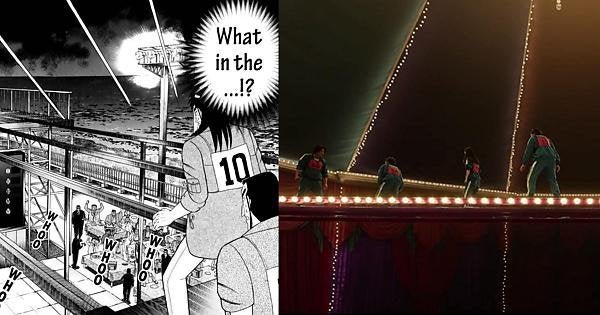To say that Netflix’s new extreme, schoolyard gambling k-drama Squid Game has been received enthusiastically by the internet would be an understatement. I hate to put it this way but, the Squid game is not the most unique show you’ll see this year.
There is this anime called Kaiji the ultimate survivor and the live-action adaptations that borrow less from it than the Squid game does. Squid game has lifted its premise, world-building, the answer to its central mystery, and most of its core themes from Kaiji. It refines, polishes, and even improves upon the brilliant premise of the anime/manga that inspired it in many ways and has independently earned its wild and internet-breaking success.
Similarity: Our poor protagonists are gambling addict
The world depicted by Kaiji the ultimate survivor is the Japan of the late 90s, a period of economic stagnation which caused unemployment to surge at a rate Japan has never seen before. Thus, enter our protagonist Kaiji, a young NEET (which means not in education, employment, and training) who spends his days playing poker, drinking and illegally earning tire badge.
In a similar fashion, Squid Game presents Gi-hun. He struggles to pay his debt, financially support his daughter, is a gambling addict, and depends on his old mother for financial support.
Dissimilarity: Different approaches to reach the high level of tension
The six games being played in Squid game are based on children’s games. Regardless of whether these games are challenging both physically and psychologically, they have a simple concept and are straightforward enough. This works in the favor of Gi-hun and other participants as there is nostalgia attached to these games. The pressure and tension are built upon the fatal consolation prizes.
Whereas Kaiji’s tension is built upon the level of complexity that is bound to increase with each passing game. Players are required to adapt to the new set of rules introduced and analyze the chances of winning in order to keep the game going.

Similarity: Both the protagonists get to win a lot of money
The protagonists from both the shows are steeped in debt and they are given chance to play a game where the winner can take all the prize money. Grabbing this opportunity with both hands is the only way to get out of the life of debt for both Gi-hun and Kaiji.
Dissimilarity: Kaiji gets to complete with a new class of competitors
Using the E-card matching, Kaiji wins against an authoritative finance corporate. But on the other hand, Gi-hun and all the other players stuck on the island in the Squid game are debt-ridden. No one is flushed with cash there, they are throwing their life on the line in order to win money and get rid of their miserable life.
Similarity: Anguished players are set against each other
Everyone had to undergo mental commotion and question whether cheating or backing others would be worth their survival. Each one of them has to compete against one another and question their morality at every moment. When it comes to life-or-death competition, viewers wouldn’t condemn the characters if they chose to find a safer outlet, or no less than breaking out alive.
Dissimilarity: What are the consequences of losing the game for Kaiji
Gi-hun takes higher grounds in this situation. Kaiji has to pay off his debt through manual labor which could take 15 years of his life. He has to gamble his way out of this miserable life even if he has to roll back on his food and water requirement. Moreover, Kaiji as the failed guarantor for his co-worker has to take on his outstanding amount of debt.
Similarity: what awaits the losers
Death awaits these losers. One wrong move and the wealthy class can enjoy watching one racehorse down. These human racehorses are purely on their luck in the game which has fatal consequences and is made to entertain the bored high class.
